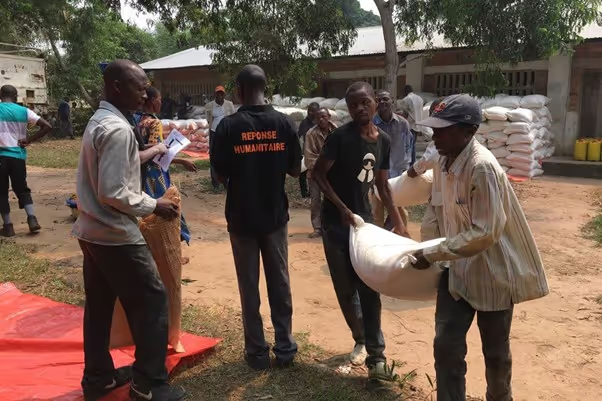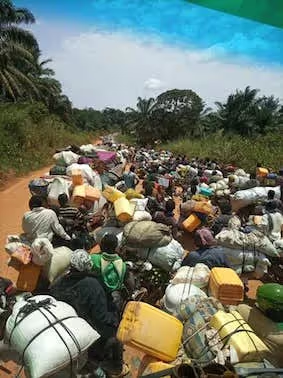.png)
More than 80,000 people displaced by clashes in eastern Democratic Republic of Congo are in urgent need of food, the UN says.
Fighting between government soldiers and March 23 Movement (M23) rebels has intensified in recent weeks in North Kivu province.
The clashes spread south early this week to about 20km (12 miles) from Goma town, the provincial capital.
Those displaced have fled to improvised sites, churches and schools, the UN office for humanitarian affairs, Ocha, says.
Humanitarian agencies fear the worst for the refugees if the hostilities continue.
In a statement on Wednesday, the spokesperson for the province's governor said they were “faced with this very worrying situation”.
"The military governor of North Kivu province calls on the population to remain calm and vigilant and to not cede to panic," Gen Sylvain Ekenge added.
M23 rebels were reported to be in control of positions about 25km from Goma town, although Gen Ekenge said the rebels were being pushed back.

The World Food Program (WFP)and its partner World Vision have launched an emergency operation to provide food assistance to 42,000 food insecure people who, due to conflict, have fled their villages in the country’s Kasai and Kasai Central provinces.
“We launched this emergency response as soon as funds became available,” said Claude Jibidar, WFP Representative and Country Director in DRC, in a press statement.
“We targeted the most vulnerable among the vulnerable, and our access to these displaced people also depend on security conditions. However, with nearly one and a half million displaced people in the Kasai region, additional donor support is essential for WFP to scale up our operations and reach more vulnerable displaced people,” he added.
WFP plans to assist 25,000 displaced persons in Kasai Central and 17,000 people in the Kasai province in the coming days, the statement elaborated. However, WFP urgently requires $17.3 million to support the operations scale-up from September to December 2017.
“Food distributions have started in the town of Tshilumba with further distributions scheduled this month. As part of this effort and where safe access is possible, WFP and the Food and Agriculture Organization (FAO) continue to identify the most vulnerable displaced people in areas identified with high levels of food insecurity, as determined in a recent food security study,” said WFP.
According to its recent food security assessment, WFP said that in the last year, the number of people in need of urgent humanitarian food assistance in the DRC rose by 1.8 million – from 5.9 million to 7.7 million.
“In conflict-ridden areas, more than 1.5 million people are facing ’emergency’ levels of food insecurity, leaving many with no option but to sell everything they have while skipping or reducing their meals,” the statement outlined.
In addition to food distributions, WFP is leading the Logistics Cluster, which provides technical and logistical support to humanitarian organizations and has been operational in the Kasai region since June.
“Mobile warehouses have been built to store food and non-food items, while several trucks have been sent to Kasai and Kasai Central to transport food and supplies,” said the statement.
To meet the huge needs of displaced people in hard-to-reach areas, since June the WFP-led UN Humanitarian Air Service has expanded its support, positioning an aircraft in Kananga in Kasai Central on a permanent basis and flying three times weekly to Tshikapa, Kasai – making those most in need more accessible to humanitarian organizations.
Scores of people have fled their villages due to the conflict that broke out in the Kasai region in August 2016.
According to the UN Office for the Coordination of Humanitarian Affairs (OCHA), there are some 1.4 million internally displaced people across the Kasai provinces. Additionally, more than31,000 have fled into neighbouring Angola.
“With up to 3.8 million people displaced in total, the DRC is home to the largest population of internally displaced people in Africa, ”underscored the statement.
The sharp deterioration in people’s food security is mainly attributable to displacement caused by an upsurge in conflict and pest infestation in crops across the country. WFP continues to coordinate with FAO and other partners to serve the most vulnerable people in the Kasai region, as well as in other parts of the country.

The latest attacks took place in the surrounding areas of Beni town, where local aid workers supported by UK charity CAFOD, are responding to the needs of an estimated 40,000 people who have arrived in the town.
The Bishop of Beni Butembo, Mgr Melchoir Sikuli said: "Beni has been hit again with over 200 people killed by rebels who attacked the villages by the border of North Kivu and Ituri around the villages of Mabelenga, Ndalya, Idou, Ndimo. Massive numbers of displaced people can be found in the center of Beni and Eringeti."
CAFOD's Country Representative Bernard Balibuno reports: "It is mainly women and children fleeing with fear in their eyes and all that they own strapped to their backs. People are now living in dire conditions, in the open air, without food, water, shelter and medical care are urgently needed, as well as essential daily items such as blankets, buckets, and cooking utensils."
Masika, a mother who fled with her six children, told aid workers: "We have walked over 75 km in the rain and now we are sleeping in the open and we have no food. Children are becoming very weak. The government officials have registered our names two days ago, but no help is coming."
Over the last year increased levels of violence across the region have forced up to a million women, children, and men to flee their homes. Host families offer vital refuge for people fleeing, despite their own challenges says Balibuno: "Host families share their already limited resources with families despite seeing their own humanitarian situation deteriorate day by day.
Balibuno concluded that Ebola and dealing with COVID-19 is a major concern:
"Local aid workers in the area are concerned at this latest mass movement of people with the resurgence of Ebola in the area and the continued spread of the Coronavirus."
THANK YOU CAFOD, BBC NEWS AND SUSTAINABLE DEVELOPMENT GOALS FOR THE ARTICLES
.png)
Contribute to your future, a Non Profit Organization and buy us a Coffee with 3 simple clicks and a minute of your time. Imagine what we can do together.
To thank you, we will call you personally.
This is the amount that will be distributed amongst the current shareholders.
Current Share Holders
1102/500,000